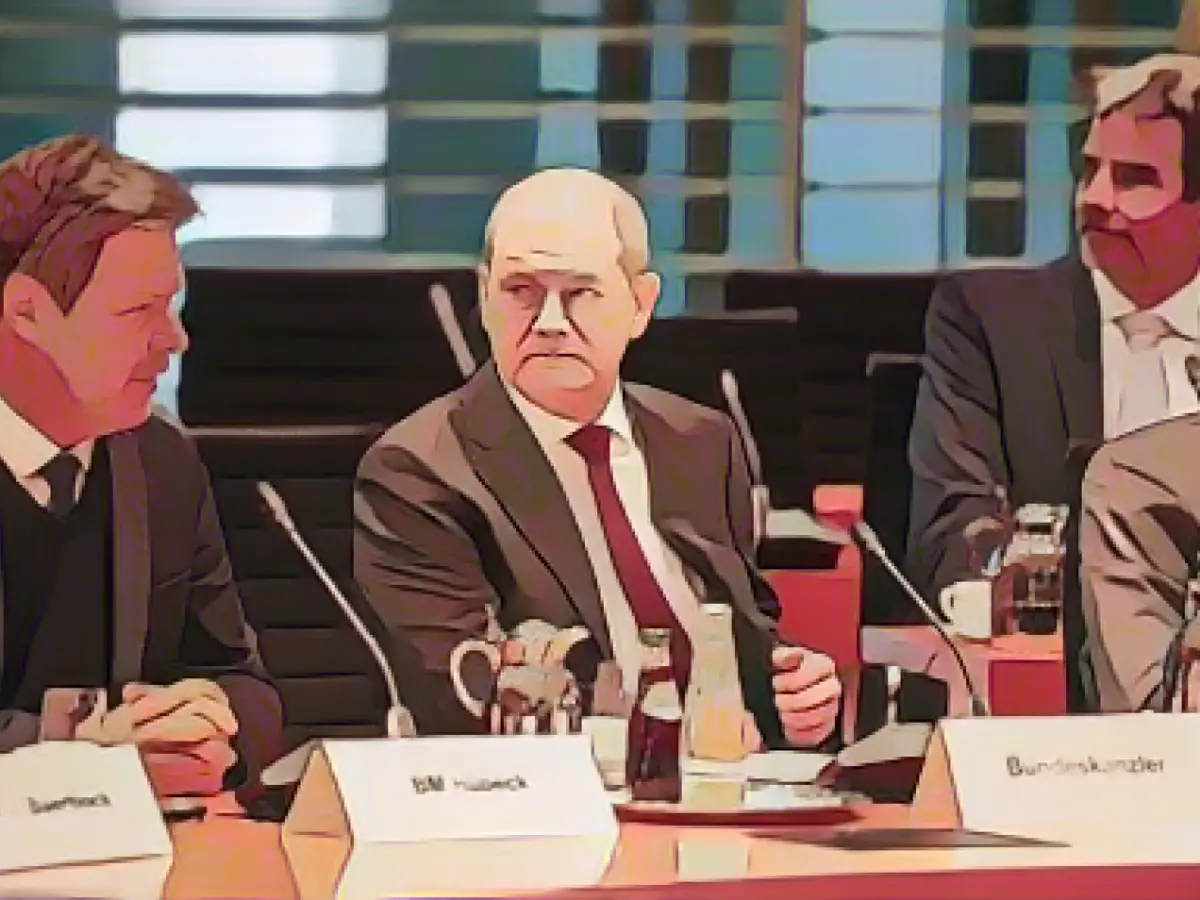Struggling to Settle on Spending Plans: Coalition Faces 2022 Budget Crunch
Is the three-color traffic light coalition capable of sorting out its spending plans before the clocks strike midnight on the year? On this chilly winter day, Chancellor Olaf Scholz (SPD), Economics Minister Robert Habeck (Greens), and Finance Minister Christian Lindner (FDP) convened yet again to hash out their budgetary disagreements – but an end to this saga remains elusive. One thing that's crystal clear: time is running out.
Government spokesperson Steffen Hebestreit treads the line between hope and reality. There's a good chance that the federal cabinet will discuss their potential plans before Santa makes his grand arrival, Hebestreit hinted in Berlin. However, the odds are slowly stacking against the budget hitting a parliamentary debate deadline.
Budget Hold-up: Wednesday's Cabinet Meeting Missed the Mark
At first light, the cabinet meeting scheduled for Wednesday morning aimed to seal the deal, smoothing the way for a hassle-free Christmas. Yet, consensus proved to be as elusive as a Bitcoiner's dream. It's time to regroup and continue talking.
In reference to a cabinet decision, Hebestreit tossed around the idea of a resolution by written majority, a move which could materialize "very soon." But he couldn't pin down a specific date – let alone week – for this eventuality. Flexibility has always been key within this coalition.
If a deal is struck, the Budget Committee in the Bundestag will need extra time to address these new plans before the general assembly is ready to argue the matter. An ideal scenario calls for a special budget week in the Bundestag, finishing up just before Christmas. Alternatively, thoughts of a Budget Committee-only Christmas debate persist – the Bundestag would approve the budget in January instead.
Narrowing Deadline for Negotiations
But achieving the much-needed political accord remains the top priority. Time must first be carved out for this critical step. Despite Habeck's decision to nix his attendance at the Dubai World Climate Conference, Scholz and other high-ranking SPD members have a jam-packed schedule. Lindner is due to rock up at the EU finance ministers' meeting in Brussels come Thursday afternoon, according to his ministry's public relations representative.
Adding fuel to the fire, Germany's highest court handed down an unexpected ruling. The Karlsruhe verdict nullified a budget reallocation, resulting in a €17 billion hole in next year's budget. This financial gap cannot solely be blamed on the Karlsruhe ruling; manufacturing relief through a planned electricity tax reduction and expanded basic income support have also chipped in.
Cost-Saving Measures and Budget Adjustments
Belt-tightening is now a top priority for coalition leaders. Efforts to cut spending, while the suspension of the debt brake for 2024 remains a possibility, are under consideration. The argument in favor of this simple – though potentially explosive – solution has yet to sway Lindner. Both the SPD and the Greens are backing this temporary suspension, yet Lindner sees additional opportunities for savings within social spending – which accounts for 45% of federal government expenditures. He stresses, "Tax hikes must be kept off the table."
Raising the Stakes: Green Party Leader Warns of Consequences
Green Party leader Ricarda Lang warned in a BR broadcast on Tuesday that the modernization of the nation and the shift towards a climate-neutral economy must not falter. "This boils down to nothing more than jobs, prosperity, and security for our citizens," she said.
An agreement that satisfies the demands of all coalition partners while avert a potential national crisis is the ultimate goal. However, the Greens have set their foot down against budging to financially support the poorest pockets of society. Lindner, in turn, sees potential cost-cutting opportunities within the realm of social spending.
Additional Insights
The 2024 collapse of the German traffic light coalition significantly impacted the 2024 budgetary proceedings. The revision of the Regionalisation Act in December 2024, pivotal for securing Deutschlandticket funding, took place following the coalition's dissolution and the urgency to ensure ticket funding through 2026[1].
- [Source:]
Enrichment Data:
The budgetary struggles faced by Germany's traffic light coalition have been nothing short of arduous, leading to its eventual fracture. Several factors have played a role in these difficulties:
- Debt Brake Constitutional Rule:
- The "debt brake" constitutional rule restricts the budget deficit of the central government to 0.35% of GDP – more stringent than the broader EU rule allowing for a 3% deficit. This rule has been a point of contention, particularly as the coalition grappled with rising healthcare and pension costs, as well as fresh growth initiatives[2][5].
- Coalition Agreement and Budget Maneuvers:
- The political alliance between the SPD, FDP, and Greens had been banking on a budget reallocation of €60 billion of COVID-19 funds to finance green investments. However, this arrangement was quashed by Germany’s constitutional court in November 2023, undermining the coalition deal[1].
- Fiscal Uncertainty and Infighting:
- The FDP had been laying the groundwork for a potential coalition government collapse, with their Finance Minister, Christian Lindner, eventually being dismissed by Chancellor Olaf Scholz. This could be traced back to longstanding ideological disagreements and fiscal uncertainty within the coalition[1].
- Energy Costs and Economic Turmoil:
- The Russia–Ukraine conflict exposed Germany's vulnerability to energy price volatility, leading to escalating winter heating bills and a drain on businesses' competitiveness. The government has shelled out at least €255 billion on energy price subsidies, adding to budgetary pressures[1].
- Implementation of Climate and Energy Policies:
- The coalition's green climate and energy agenda have faced significant political hurdles. Several proposed policy measures, such as the Power Plant Safety Act and the geothermal acceleration act, have encountered delays or been shelved due to political infighting and opposition from various parties[1].
These challenges in conjunction have significantly weakened the traffic light coalition, eventually leading to its dissolution before the 2025 general election. The coming election is expected to carry major consequences for Germany's economic and energy policies going forward.








